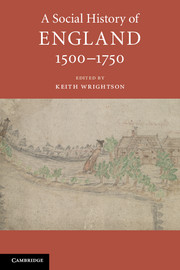Book contents
- Frontmatter
- Contents
- List of Figures
- List of Tables
- List of Contributors
- Acknowledgements
- List of Abbreviations
- Introduction: Framing Early Modern England
- PART I DISCOVERING THE ENGLISH
- PART II CURRENTS OF CHANGE
- PART III SOCIAL IDENTITIES
- 12 ‘Gentlemen’: Remaking the English Ruling Class
- 13 The ‘Middling Sort’: An Emergent Cultural Identity
- 14 The ‘Meaner Sort’: Labouring People and the Poor
- 15 Gender, the Body and Sexuality
- 16 The English and ‘Others’ in England and Beyond
- Coda: History, Time and Social Memory
- Further Reading
- Index
16 - The English and ‘Others’ in England and Beyond
from PART III - SOCIAL IDENTITIES
Published online by Cambridge University Press: 28 May 2018
- Frontmatter
- Contents
- List of Figures
- List of Tables
- List of Contributors
- Acknowledgements
- List of Abbreviations
- Introduction: Framing Early Modern England
- PART I DISCOVERING THE ENGLISH
- PART II CURRENTS OF CHANGE
- PART III SOCIAL IDENTITIES
- 12 ‘Gentlemen’: Remaking the English Ruling Class
- 13 The ‘Middling Sort’: An Emergent Cultural Identity
- 14 The ‘Meaner Sort’: Labouring People and the Poor
- 15 Gender, the Body and Sexuality
- 16 The English and ‘Others’ in England and Beyond
- Coda: History, Time and Social Memory
- Further Reading
- Index
Summary
The English set themselves in opposition to a variety of European ‘others’ with the ebb and flow of European politics: first the Spanish in the sixteenth century, then the Dutch in the seventeenth century and finally the French in the eighteenth century. This protracted European quadrille coincided with a conceptual shift from a world divided between Christians and ‘infidels’, as Christians dubbed Muslims, to one of Christians and ‘heathens’, or ‘savages’, or ‘pagans’, as Europeans labelled the people they encountered in this era in America, Africa and Asia. England's global transition in these centuries created the conditions that defined English interactions with people around the world. Between 1500 and 1750 the English confronted an increasing number and variety of non-English people within and beyond England because of three factors: national consolidation, commercial and territorial expansion, and continental wars and the Protestant refugees they displaced. National consolidation shoved English, Welsh, Scots and Irish into sometimes uncomfortable proximity. Global expansion and continental warfare brought distant people to England, as refugees, traders, diplomats, slaves and curiosities, while hundreds of thousands of English people travelled overseas, as soldiers, mariners, traders and colonists, and as a result found themselves in face-to-face encounters with a wide array of foreign people. There were new spaces for interactions with others, and new kinds of others to be met. Places like the American continents, barely grasped in 1500, had become by 1750 both alluring places of settlement and cultural cauldrons where the English lived embroiled with other Britons, continental Europeans, Africans and Amerindians. These encounters produced new people, children of mixed race, whose existence fostered the emergence of new categories and laws to legislate as ‘other’ those children born of English parents in English domains.
Four trends have distinguished historical scholarship on ‘others.’ Firstly, scholars have tended to study these populations as discrete groups, exploring English interactions with single ethnic communities. One by-product of this attention to single populations is a tendency among some scholars to make claims for the exemplary ‘otherness’ of the population under study. Edited compendiums on multiple populations compensate in some respects for this tradition of discrete historical enquiry, as do studies of single places, whether cities or colonies, with varied inhabitants. A second important trend has been an emphasis on London.
- Type
- Chapter
- Information
- A Social History of England, 1500–1750 , pp. 352 - 372Publisher: Cambridge University PressPrint publication year: 2017
- 1
- Cited by



